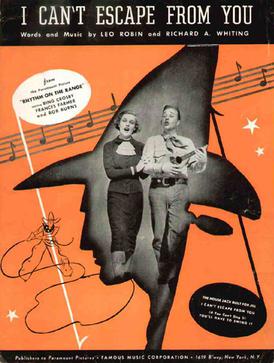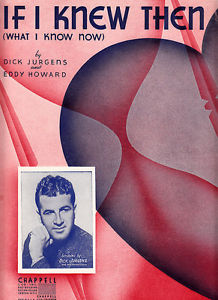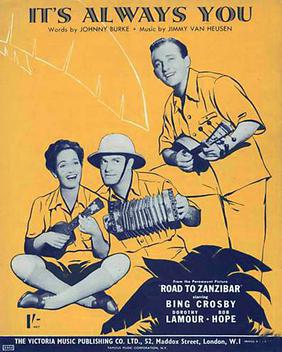"Because" is a song with music and lyrics by Guy d'Hardelot and English lyrics by Edward Teschemacher, originally published in 1902.
"If I Give My Heart to You" is a popular song written by Jimmy Brewster, Jimmie Crane, and Al Jacobs. The most popular versions of the song were recorded by Doris Day and by Denise Lor; both charted in 1954.

"All Alone" is a popular waltz ballad composed by Irving Berlin in 1924. It was interpolated into the Broadway show The Music Box Revue of 1924 where it was sung by Grace Moore and Oscar Shaw. Moore sat at one end of the stage under a tightly focused spotlight, singing it into a telephone, while Oscar Shaw sat at the other, doing the same.
"Prisoner of Love" is a 1931 popular song, with music by Russ Columbo and Clarence Gaskill and lyrics by Leo Robin.

"Moonlight Bay" is a popular song. It is commonly referred to as "On Moonlight Bay". The lyrics were written by Edward Madden, the music by Percy Wenrich, and was published in 1912. It is often sung in a barbershop quartet style. Early successful recordings in 1912 were by the American Quartet and by Dolly Connolly.

"By the Light of the Silvery Moon" or "By the Light of the Silv'ry Moon" is a popular love song. The music was written by Gus Edwards, and the lyrics by Edward Madden. The song was published in 1909 and first performed on stage by Lillian Lorraine in the Ziegfeld Follies of 1909. It was one of a series of moon-related Tin Pan Alley songs of the era. The song was also used in the short-lived Broadway show Miss Innocence when it was sung by Frances Farr.

"My Buddy" is a popular song with music written by Walter Donaldson, and lyrics by Gus Kahn. The song was published in 1922 and early popular versions were by Henry Burr (1922), Ernest Hare (1923) and Ben Bernie.
"It's the Talk of the Town" is a popular song written by Jerry Livingston, the lyrics by Al J. Neiburg and Marty Symes.
"South of the Border Down Mexico Way" is a popular song describing a trip to Mexico, written by Jimmy Kennedy and Michael Carr. It was originally released in 1939, with many versions following, including one for the film of the same name sung by star Gene Autry.
"You Brought a New Kind of Love to Me" is a 1930 popular song. The credits list music and lyrics as written by Sammy Fain, Irving Kahal, and Pierre Norman. Since Fain was primarily a music writer and Kahal a lyricist, it may be assumed that the music was by Fain and lyrics were by Kahal, with Norman's contribution uncertain.
"Street of Dreams" is a song and foxtrot composed in 1932 by Victor Young, with lyrics by Sam M. Lewis. There were three successful recordings of the song in 1933 by Guy Lombardo, Ben Selvin and Bing Crosby.

"Nobody's Sweetheart", also known as "Nobody's Sweetheart Now" and "You're Nobody's Sweetheart Now", is a popular song, written in 1924, with music by Billy Meyers and Elmer Schoebel, and lyrics by Gus Kahn and Ernie Erdman. The song is a jazz and pop standard.
"Isn't This a Lovely Day?" is a popular song written by Irving Berlin for the 1935 film Top Hat, where it was introduced by Fred Astaire in the scene where his and Ginger Rogers' characters are caught in a gazebo during a rainstorm. The lyric is an example of a song which turns a bad situation into a love song, a common style for Irving Berlin, as in "I've Got My Love to Keep Me Warm" and "Let's Have Another Cup of Coffee".

"Way Down Yonder in New Orleans" is a popular song with music by John Turner Layton Jr. and lyrics by Henry Creamer. First published in 1922, it was advertised by Creamer and Layton as "A Southern Song, without A Mammy, A Mule, Or A Moon", a dig at some of the Tin Pan Alley clichés of the era.
"Paradise" is a 1931 song with music by Nacio Herb Brown and lyrics by Gordon Clifford. It was first sung by Pola Negri in RKO Pictures' 1932 film A Woman Commands, and has since been heard in many other films, including a memorable performance by Gloria Grahame, in the 1949 Nicholas Ray film A Woman's Secret.

"I Can't Escape from You" is a song written music by Richard A. Whiting and lyrics by Leo Robin for the 1936 Paramount Film "Rhythm on the Range", and first introduced in the film when Bing Crosby sang it to Frances Farmer. Crosby recorded it for Decca Records that same year with the Jimmy Dorsey Orchestra and it was in the hit parade for 11 weeks reaching a peak position of No. 7. Crosby recorded the song again in 1954 for his album Bing: A Musical Autobiography.
"Careless Hands" is a popular song written by Carl Sigman and Bob Hilliard, and first recorded in 1948.

"If I Knew Then" is a 1939 song written by Dick Jurgens and Eddy Howard, and performed by Jurgens' big band with Howard singing. Their version charted briefly in 1939.
Bing Crosby recorded the song on February 9, 1940 with John Scott Trotter and His Orchestra. It was also covered by Johnny Mercer and his Pied Pipers (1945), Sammy Kaye and his Orchestra, Sarah Vaughan on Sarah Vaughan with Clifford Brown and Swingin' Easy, Val Doonican (1968) and many others.
"Miss You" is a 1929 song by the Tobias brothers: Charles Tobias, Harry Tobias and Henry Tobias. It was the three brothers' first published song, and their first hit, but one of the few songs where all three collaborated.

"It's Always You" is a song written by Jimmy Van Heusen (music) and Johnny Burke (lyrics) for the 1941 film Road to Zanzibar. In the film it was sung by Bing Crosby to Dorothy Lamour as they paddled a canoe up a jungle river. It was also used briefly in a comedy scene in the film as a quasi-requiem for Lamour's character, who was erroneously thought to have been killed by a leopard.









